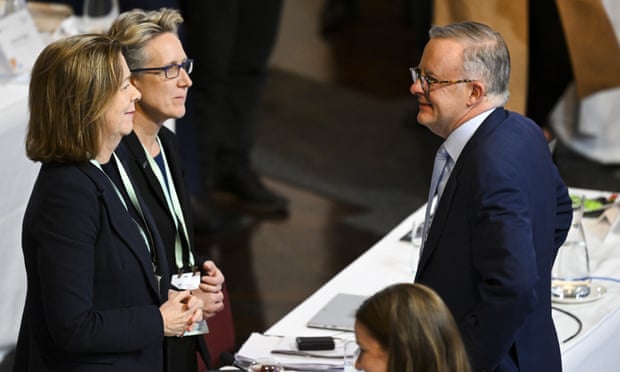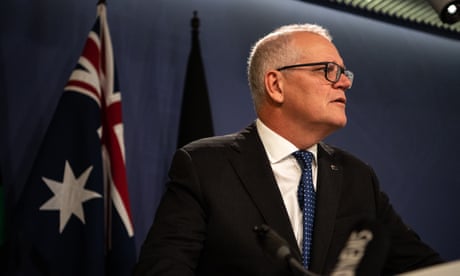Extract from The Guardian

Last week’s warning from the US president, Joe Biden, of the fragility of the American experiment to “an extremism that threatens the very foundations of our republic” presages the march of authoritarianism from Ankara to Budapest, Kyiv to Taipei.
We are lucky that – to date – the Australian expression of discontent has led to the rise of a ragtag bunch of principled, non-aligned independents drawn from the worlds of medicine, journalism and business, and not the kleptocrats that have ridden similar waves of cynicism and disengagement in other lands.
But we would be naive to think that Australia is immune to populist extremism. While we might think that such excesses happen in other places, the stark reality is that our most recent prime minister secretly expanded his executive powers here as well.
Findings in this week’s Guardian Essential report show about half of respondents see Scott Morrison as a diminished figure who should resign from parliament.
Even Coalition voters appear done with their former leader, with nearly half telling us he has diminished the reputation of his government, while one-third believe he should resign immediately.
Many of the former prime minister and his government’s attacks on our institutions were less opaque: the division by design, the preferencing of funds to friendly seats, the appointments of foot-soldiers to plum jobs, the dismissing of parliamentary processes as “the Canberra bubble” – all staring at us in plain sight.
As a consequence, Anthony Albanese has inherited more than a fiscal deficit; he has also inherited a deficit of trust in our major institutions.
Of all those institutions on our list, federal parliament has the lowest rating, with fewer than one in 10 voters having “a lot of trust” and nearly half of all voters having a trust deficit.
The need for a federal Icac was central to the election campaign, and particularly the rise of teal independents who repudiated the complicity of purported moderate Liberals in the service of the former Morrison government.
Alongside climate and gender, integrity became part of a political trinity that mobilised thousands of disenchanted voters to break the political pendulum and demand an end to the cycle of favours and rorts that have turned so many of them against the political process.
There is now such overwhelming support for a federal Icac that it is hard to understand how the Coalition got itself stuck into standing in its way, creating the impression that its model of ruling might not bear scrutiny.
While a federal Icac is timely, it will take more than a formal body with powers to launch investigations to restore this lost trust in our system.
Political integrity is about more than “corruption” as legally defined, more than the procession of illegal transactions that have landed former state officials and politicians from all parties in the dock and, for some, in prison.
There is a broader corruption of the political process, embodied in the system’s inability to deliver in the interests of ordinary citizens – something that outrages teals and Maga supporters alike.
It is expressed in growing economic inequality and the pitting of one group of citizens against another; a sense the whole system is broken and has stopped working, so why not trust a strong leader to step in and turn the whole thing over?
This is not about any single act of capital “C” corruption, but the operating system of deals and mutually reinforcing self-interests that, while not in breach of any law, comes to violate the very principle of good government.
While a corruption watchdog is an important legal change and signal of intent, it is not a cure-all; just as important is the way an elected leader exercises the power bestowed on them.
Where Morrison hoarded it, Albanese’s inclination appears to be to share it. Last week’s jobs and skills summit was more than just a “talkfest” – it was a model for a more inclusive and civil way of exercising power.
Representative participants were invited to collaborate, to identify solutions to common problems and then work with the government to implement it: business, union and civil society and elected representatives that chose to turn up.
While Peter Dutton and his team were carping from the sidelines with ritualised union-bashing agitprop, the National party leader, David Littleproud, was in there rolling up his sleeves with unions and working through complex issues on agricultural visas and food supply.
There was an integrity inherent in the engagement on the floor that spoke to Biden’s entreaty to “see politics not as total war, but mediation of our differences”.
Of course, there was a degree of stage management, and landing the concrete actions of the summit will be harder. But continuing on that collaborative journey will be every bit as important to rebuilding the integrity of our democratic system as the long overdue Federal Icac.
Peter Lewis will discuss the findings of this week’s Essential Report with Guardian Australia’s chief political correspondent Sarah Martin at 1pm today. Free registration here
This story was amended on 6 September, 2022, to clarify the poll results

No comments:
Post a Comment